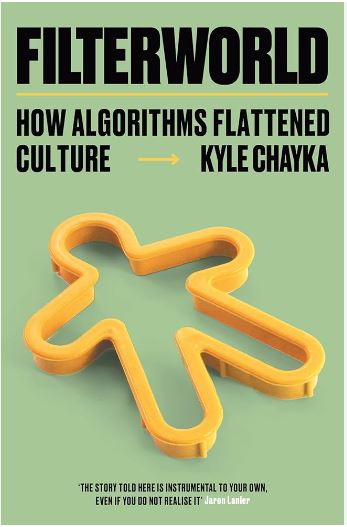
Filterworld: How Algorithms Flattened Culture
Kyle Chayka, known for his work on the internet and digital culture, takes an in depth look at the impact of the extensive algorithm networks that are embedded across the internet and their impact on today’s culture. Whilst there is an element of reminiscing into the familiar beeps and buzzing of dial up internet from childhood, the book focuses on the 2010’s and the changing face of social media and digital platforms.
For anyone who is not familiar with the intense grip algorithms have on digital culture, this is a pretty terrifying introduction. Chayka looks at how algorithms have inexorably shaped culture from the “Rise of Algorithmic Recommendations”, to what is anticipated to be your taste in music through his review of the “Disruption of Personal Taste”. Chayka leads the reader on a journey to establish if “our algorithmically sorted lives are increasingly void of value” as we become dependent on choices, unknowingly or perhaps knowingly, made on our behalf.
“In place of the human gatekeepers and curators of culture, the editors and DJs, we now have a set of algorithmic gatekeepers. While this shift has lowered many cultural barriers to entry, since anyone can make their work public online, it has also resulted in a kind of tyranny of real-time data. Attention becomes the only metric by which culture is judged, and what gets attention is dictated by equations developed by Silicon Valley engineers. The outcome of such algorithmic gatekeeping is the pervasive flattening that has been happening across culture. By flatness I mean homogenization but also a reduction into simplicity: the least ambiguous, least disruptive, and perhaps least meaningful pieces of culture are promoted the most. Flatness is the lowest common denominator, an averageness that has never been the marker of humanity’s proudest cultural creations.”
It’s hard not to self-associate throughout the book, as the impact of algorithms, however gently, has seeped into all digital sectors. Chayka makes it easy to recognise the strong bearing it has in our personal lives, from the tailored photos we take and upload onto Insta, to our professional lives – validation of a LinkedIn post. Perhaps most damaging, is the perceived access of unbiased material on search engines which has, in reality, been individually curated for us to our own theoretical tastes. Interestingly Chayka, the digital expert, continues to express the need for personal human choice rather than benign acceptance of those being put on us from a bot.
“A first step of escaping the algorithms grip is recognising it, by moving away from the mindset of passive consumption and thinking about a post algorithmic digital ecosystem we can begin to construct the alternative.”
What is clear from Chayka is that for the last decade the shift in online interaction has been incalculable, and to avoid the algorithmic assault you would have had to have lived under a rock. That is not to say that all ‘algorithms are bad’ but it’s hard to see how culture and taste can naturally develop, particularly for those growing up in this digital era, with their tastes pre-determined. Chayka’s suggestion that you can “seek out you own cultural rabbit hole” assumes those who have been brought up solely in the existing digital environment are able to recognise the limits already superficially imposed.
This is an interesting read and an eye opener for the less digitally savvy with a level of insight that leads the reader on a personal journey. Chayka makes you think and reflect on your own curated narrative, which is the described purpose by the author. Enjoy with a glass of wine and not on your kindle!
